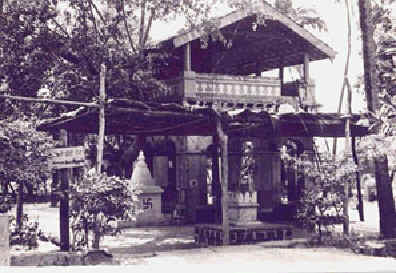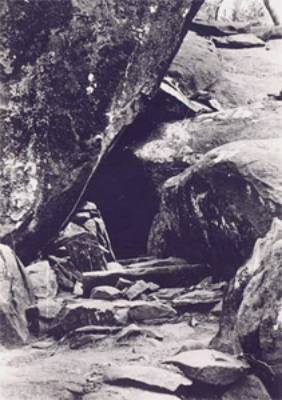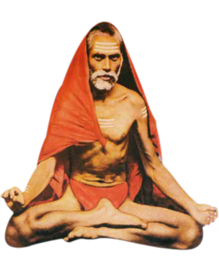A compact Biography of Shri Vasudevanand Saraswati Tembe Swami Maharaj
Mangaon Temple: IdolTowards the end of his stay at Wadi, Lord Dattatreya communicated to Shri Vasudeo Shastri his plan to "reside in Mangaon for seven years". Soon thereafter Shastriji set out for Mangaon for the necessary preparations for the Lord’s stay. After paying his respects to the Mother of the Universe (Mahalaxmi) at Kolhapur, he was passing through the market of a town called Kagal, thinking about the idol of Lord Dattatreya for the proposed temple at Mangaon. Suddenly his eyes fell on a sculptor’s shop when the sculptor himself came out of the shop and after salutations started saying, "Shastriji, please give me the specifications of the idol you want and I shall make exactly what you want. Please do not worry about money." The sculptor had received instructions from the Lord to make the idol for Shastriji. Consequently, Shastriji stayed at Kagal for a couple of days. As per his instructions, the sculptor made a brass idol about seven fingers width tall, sitting in siddha posture with two arms signalling bestowal (var) and protection (abhay). The sculptor’s charges amounting to about 20-25 rupees were paid collectively by some local gentlemen. |
| aking the idol Shastriji returned to Mangaon. As he was nearing his home, an empty space caught his attention, which he thought, would be suitable for the temple. However as the land belonged to someone else, he kept his thought to himself and kept the idol in a corner in his home. Within a couple of days the widow of the owner of the land had a dream instructing her to donate her land to a Brahmin. She approached Shastriji’s mother for advice. On her suggestion, the lady donated her land to Shastriji for the proposed temple. Having thus received the idol and the land without much effort, Shastriji immediately started the construction of the temple. |

| With inspired assistance from the residents in the form of material, money and labour, the temple facing east, was completed in a mere seven days. A well was dug up nearby in three days. Shastriji constructed the sanctum with bricks laid by his own hands. The idol from Kagal was consecrated in the new temple on the 5th bright day of Vaishakh of A.D. 1883. Since Shastriji believed this temple to be an extension of the Narsobawadi temple, all cash offerings in excess of a rupee used to be sent to Wadi. Only a quarter of the remaining income was paid to Shastriji’s family. Shastriji used to stay alone in the temple premises and used to obtain foodstuff by begging and cook himself after distributing to the guests of the temple. He used to discharge his priestly duties with great dedication, strict discipline and deep love. A couple of cows and dozens of dogs formed a part of the temple establishment and were well looked after. All major traditional Hindu festivals were celebrated in the temple as in any Hindu family. |
| An Audumbar tree grew in the foreground of temple. A platform was built around it and Shri Datta Padukas were installed on it and regular worship accorded to them. Everything was conducted strictly according to the scriptural code and the instructions from the Lord. Smallest deviation or contamination, used to invite disapproval of the Lord and sometimes the guilty used to be punished and purification carried out. As the temple grew in stature, people started addressing Shastriji with the respectful epithet of Buwa. Personal conduct of Buwa was ideal. Getting up two hours before sunrise, he used to practice Yoga. Then after ablutions and bath, he used to perform his personal prayers and worship and then perform the worship of the temple idol. Then he used to go round to collect foodstuff by begging and also pick up wood for fuel, on the way back. After cooking the food himself, he used to offer it to the sacrificial fire (vaishwadev) and set aside portions for the cow and guest/s and then partake the remaining food, which mostly consisted of rice and green beans (moong daal). In the afternoon, some students used to come to take lessons in scriptures, grammar, poetry etc. Some distressed persons seeking relief or some seeking fulfilment of desires or a few genuine seekers of truth used to come and seek Buwa’s advice in the afternoon. Later in the afternoon Buwa gave religious discourses. With sunset, evening services (Aarati, mantra pushpa) were conducted. Then, before going to bed he used to read religious and spiritual books and practice yoga. He did not have any physical contact with his wife unto this time. |
Shri GurucharitamAt this stage, Lord Shri Datta commanded Buwa to render the Marathi Gurucharitra in Sanskrit. Buwa started composing the manuscript and completed it in less than two weeks. On completion he heard the voice of the Lord saying “this book has two thousand verses). When Buwa counted the verses were substantially less than 2000. After some thinking, he recounted the verses in the manner of saptashati, counting half-verses and uvach mantras, the count added up to 2000. This was the first major work of Buwa and his friends were surprised to see him compose it. They asked him," Buwa, you have hardly been out of Mangaon. How come you can compose such wonderful book?" Buwa replied, "I do not compose it. I just copy on paper the words I see!" The saintly quality of disowning all credit for their achievements was thus evident in Buwa. Once, while performing a noontime Aarati, an inspired poem gushed out from Buwa’s mouth. When he wrote it out in the afternoon, recalling the words, it was found that the poem (Aarati) comprised of the meaning of the four mahawakyas (the great sentences), which form the basis of Vedic philosophy. |
Yogic ProgressBuwa was a regular and advanced practitioner of Yoga, the ancient Indian science of union with divinity. Starting with physical disciplines viz. postures, attitudes, cleansing practices, the student progresses through breath control to command the life force (prana) and finally the mind. Complete cessation of pranic and mental activity is the final aim of Yoga, when the Yogi or seer gets established in his Real Nature. (atanjali’s Yogsutra). He thus realizes his Self and is completely freed of all worldly sorrows, bonds and cravings and attains Knowledge, Bliss and the Essence of Being. For years Buwa used to go to a cave near Mangaon for yogic practice. Later he was directed by the Lord to practice yoga at the temple itself. Once due to some error in the practice of yoga Buwa was afflicted with persistent hiccups. Lord Dattatreya directed him to a revenue officer in a village named Kapashi. When Buwa approached him, the gentleman flatly denied any knowledge of yoga. |
| Ordinarily a genuine student of Yoga or any traditional Indian science will not reveal himself to every other curious person. The traditional knowledge is guarded as a Mangaon Cave for meditation for the good of humanity. The purpose of this secretive tradition is to prevent the knowledge from falling into the wrong hands whereby a lot of harm can incur to the society. Buwa 1was not to be denied so easily, however. He told the revenue officer that he had come to seek his guidance on Lord Dattatreya’s instructions and would not leave without obtaining it. Finally, on himself receiving Lord’s signal, the yogi not only told Buwa the cause and cure of the hiccup, but also gave an ancient manuscript of the conversation between Kabir and Dharmdas which was very helpful for Buwa’s further progress in yoga. With constant guidance and help from the Lord, Buwa soon became an adept and a master. He soon acquired the supernatural powers (siddhis) associated with higher stages of Yoga. He started reading minds and would tell people about their problems as soon as he saw them. This went on for almost a year when Lord Datta forbade it. In his entire life, Buwa was to later reveal, he had rarely availed of these powers. |

The Black MagicAs Buwa’s fame started spreading and his reputation growing, there were people jealous of him. Some of them established Datta temples in competition. Not only they failed to evoke any response but also some of them met with some misfortune or other and these temples were closed down. Buwa also incurred enmity of some persons while protecting some victims of their black magic. One such person targeted Buwa himself. Though fully capable of retaliating the magic Buwa desisted from doing so as it would have harmed, even killed the perpetrator. Such was his commitment to non-violence that he preferred to suffer the consequences of the black magic rather harming its perpetrator. Thus he was afflicted with chronic dysentery and suffered from it all his life. The ailment interrupted the yoga practice and Buwa was directed by Lord Datta to consummate his long neglected marriage. |
Family wayBuwa’s family was happy to get the news. A small room in the rear of the temple served as the venue of Buwa’s married life. Buwa continued to take his lunch at the temple. Sou. Annapurna- his wife however, used to go home for lunch and return at nightfall after finishing her household chores at home. One night, when she returned to the temple, Buwa was not in their room. She came to the sanctum looking for him where he was engrossed in reading something. So she sat outside waiting for him to finish since women were not allowed inside the sanctum. After considerable time, Buwa came out of the sanctum and found his wife in deep meditation. Calling her out and even shaking her too failed to break her trance and Buwa had to employ some yogic techniques to wake her up. After opening her eyes she said, “why did you wake me up? I was in such a bliss!” This is an example of God’s grace leading a true devotee to the highest yogic state even without any study of yoga. |
Goodbye to MangaonSoon Sou. Annapurna was pregnant. Unfortunately, Buwa’s mother reacted adversely to the development and was nasty to her daughter-in-law. Buwa was pained at this. Even as he was wondering about the future, one morning after the daily worship, the Lord told him, “We have to leave Mangaon today!” When Buwa remonstrated that it was not yet seven years, he was assured that it was seven years by lunar calendar! He was further instructed by Lord Datta to take the idol and his wife along. Accordingly, he packed up and took leave of his mother who thought he is going on another of his pilgrimage to Wadi and was a bit indifferent. He then told his wife to accompany him if she wished. She immediately prepared to join him. Buwa instructed her to remove all jewellery except the Mangal Sutra and she complied. Thus within an hour of the Lord’s order, the couple was on the way to Savantwadi. Buwa was carrying two idols, a small box of gadgets of daily worship and a metal flask for water. His wife carried a change of clothes. These were the only belongings they took while leaving Mangaon for good. He told the relatives and acquaintances who came to see them off that he had nothing in Mangaon. They reached Savantwadi in an hour or so where Sou. Annapurna took her lunch at Naropant Ukidave and Buwa cooked his meal from the foodstuff obtained by begging. Ukidave pressed them a some clothes and essentials for the way and by evening the couple resumed their to Narsobawadi. On reaching Wadi and paid homage to the lotus feet of Lord Datta and to the two revered saints, Shri Govind Swami and Shri Mouni Swami and acquainted them with the Lord’s order to live in Wadi. The couple then settled down in a dharmashala (public shelter). Buwa used to bring daily rations by begging and his wife used to cook the food. They often entertained guests with the same Spartan fare. Once all sanyasis (monks) in Wadi came to them for lunch since the all priests of Wadi were in the mourning. In due course, Sou. Annapurna delivered a stillborn child. |
Shri Govind Swami's endLater Shri Govind Swami’s end approached. He called Buwa and elucidated the ten major Upanishads to him and gave the books and shaligram to Buwa. Shri Govind Swami soon became ill and asked Buwa to read Manan or the book of contemplation. While Buwa read it to him Swami explained its concealed meaning and in the end, blessed him. The day prior to Shri Govind Swami’s end Buwa came to know of the imminent end and spent the day by Swami’s bedside. Everybody in Wadi including Mouni Swami grieved the eventual passing away. His body was flown into the Krishna waters as befitting a Sanyasi. Buwa only performed the last rites. |
Download PDF version of compact bography

